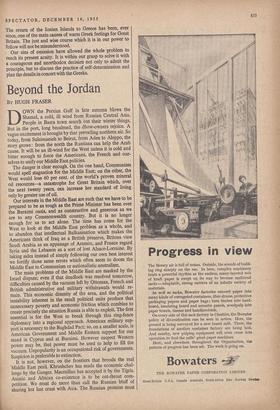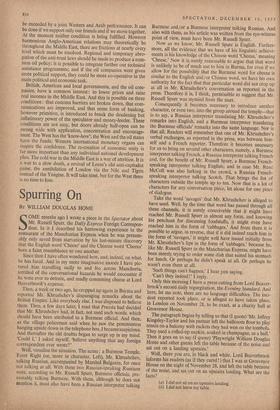Beyond the Jordan
BY HUGH FRASER DOWN the Persian Gulf in late autumn blows the Shamal, a cold, ill wind from Russian Central Asia. People in Basra town search out their winter things. But in the port, long becalmed, the dhow-owners rejoice. A vague excitement is brought by that prevailing northern air. So today, from Suleimanieh to Beirut, from Aden to Aleppo, the story grows: from the north the Russians can help the Arab cause. It will be an ill-wind for the West unless it is cold and bitter enough to force the Americans, the French and our- selves to unify our Middle East policies.
The danger is clear enough. On the one hand, Communism would spell stagnation for the Middle East; on the other, the West would lose 60 per cent. of the world's proven mineral oil resources—a catastrophe for Great Britain which, over the next twenty years. can increase her standard of living only by greater use of oil.
Our interests in the Middle East are such that we have to be prepared to be as tough as the Prime Minister has been over the Buraimi oasis, and as constructive and generous as we are to any Commonwealth country. But it is no longer enough for us to act alone. The time has come for the West to look at the Middle East problem as a whole, and to abandon that intellectual Balkanisation which makes the Americans think of Iraq as a British preserve, Britons view Saudi Arabia as an appanage of Aramco, and France regard Syria and the Lebanon as a sort of lost Alsace-Lorraine. By taking sides instead of simply following our own best interest we fortify those same errors which often seem to doom the Middle East to Communism or nationalistic neutralism.
The main problems of the Middle East are masked by the Israel dispute; even if that deadlock was resolved tomorrow, difficulties caused by the vacuum left by Ottoman, French and British administrative and military withdrawals would re- main. This economic disunity of the area, and the political instability inherent in the small political units produce that unnecessary poverty and economic friction which combine to create precisely the situation Russia is able to exploit. The first essential is for the West to break through this ring-fence diplomacy into a regional approach. American military sup- port is necessary to the Baghdad Pact; so, on a smaller scale, is American Government and Middle Eastern support for our stand in Cyprus and at Buraimi. However suspect Western power may be, that power must be used to help to fill the vacuum. Unpopularity is an occupational risk of governments. Suspicion is preferable to extinction.
It is not, however, on the frontiers that broods the real Middle East peril. Khrushchev has made the economic chal- lenge by the Ganges. Macmillan has accepted it by the Tigris. Asiatic and African co-existence is to be cut-throat corn- petition. We must do more than call the Russian bluff of sharing her last crust with Asia. The Russian promise must be exceeded by a joint Western and Arab performance. It can be done if we support only our friends and if we move together. At the moment neither condition is being fulfilled. However harmonious Anglo-American relations may theoretically be throughout the Middle East, there are frictions at nearly every level which must be resolved. Regional and temporary abro- gation of the anti-trust laws should be made to produce a com- mon oil policy; it is possible to integrate further our technical assistance programmes; and if the oil companies were given more political support, they could be more co-operative in the main political and economic task.
British, American and local governments, and the oil com- panies, have 'a common interest : to lower prices and raise real incomes in the Middle East. And this is possible on three conditions : that customs barriers are broken down, that com- munications are improved, and that some form of banking, however primitive, is introduced to break the deadening but inflationary power of the speculator and money-lender. These conditions are not easy, but doors already half-open can be swung wide with application, concentration and encourage- ment. The West has the 'know-how': the West and the oil states have the funds; Western international monetary organs can inspire the confidence. The re-creation of economic unity is far more important than any individual national development plan. The cold war in the Middle East is a war of attrition. It is a war to a slow death, a revival of Lenin's old anti-capitalist game, the annihilation of London via the Nile and Tigris instead of the Yangtse. It will take time, but for the West there is no time to lose.



































 Previous page
Previous page